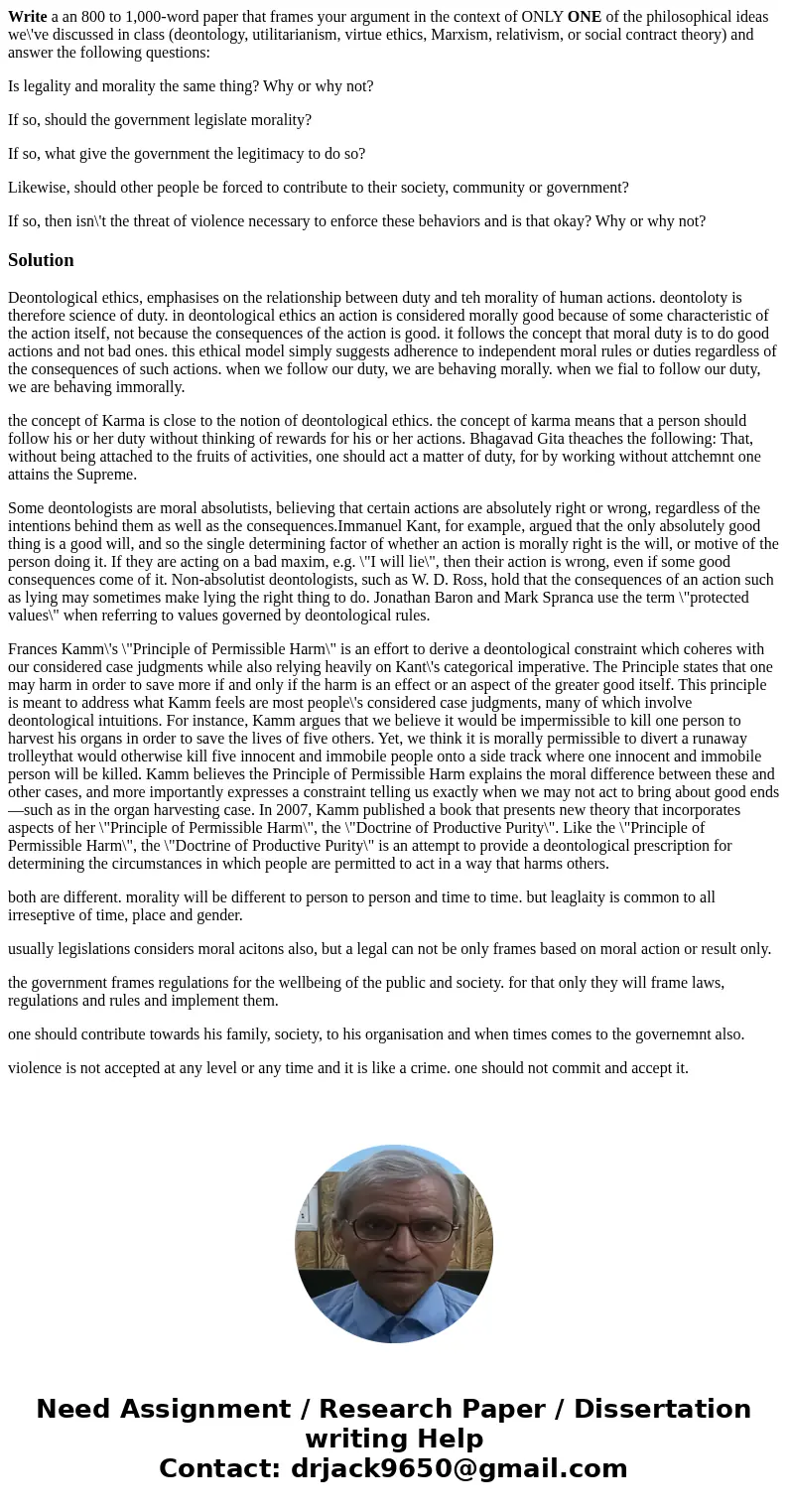Write a an 800 to 1000word paper that frames your argument i
Write a an 800 to 1,000-word paper that frames your argument in the context of ONLY ONE of the philosophical ideas we\'ve discussed in class (deontology, utilitarianism, virtue ethics, Marxism, relativism, or social contract theory) and answer the following questions:
Is legality and morality the same thing? Why or why not?
If so, should the government legislate morality?
If so, what give the government the legitimacy to do so?
Likewise, should other people be forced to contribute to their society, community or government?
If so, then isn\'t the threat of violence necessary to enforce these behaviors and is that okay? Why or why not?
Solution
Deontological ethics, emphasises on the relationship between duty and teh morality of human actions. deontoloty is therefore science of duty. in deontological ethics an action is considered morally good because of some characteristic of the action itself, not because the consequences of the action is good. it follows the concept that moral duty is to do good actions and not bad ones. this ethical model simply suggests adherence to independent moral rules or duties regardless of the consequences of such actions. when we follow our duty, we are behaving morally. when we fial to follow our duty, we are behaving immorally.
the concept of Karma is close to the notion of deontological ethics. the concept of karma means that a person should follow his or her duty without thinking of rewards for his or her actions. Bhagavad Gita theaches the following: That, without being attached to the fruits of activities, one should act a matter of duty, for by working without attchemnt one attains the Supreme.
Some deontologists are moral absolutists, believing that certain actions are absolutely right or wrong, regardless of the intentions behind them as well as the consequences.Immanuel Kant, for example, argued that the only absolutely good thing is a good will, and so the single determining factor of whether an action is morally right is the will, or motive of the person doing it. If they are acting on a bad maxim, e.g. \"I will lie\", then their action is wrong, even if some good consequences come of it. Non-absolutist deontologists, such as W. D. Ross, hold that the consequences of an action such as lying may sometimes make lying the right thing to do. Jonathan Baron and Mark Spranca use the term \"protected values\" when referring to values governed by deontological rules.
Frances Kamm\'s \"Principle of Permissible Harm\" is an effort to derive a deontological constraint which coheres with our considered case judgments while also relying heavily on Kant\'s categorical imperative. The Principle states that one may harm in order to save more if and only if the harm is an effect or an aspect of the greater good itself. This principle is meant to address what Kamm feels are most people\'s considered case judgments, many of which involve deontological intuitions. For instance, Kamm argues that we believe it would be impermissible to kill one person to harvest his organs in order to save the lives of five others. Yet, we think it is morally permissible to divert a runaway trolleythat would otherwise kill five innocent and immobile people onto a side track where one innocent and immobile person will be killed. Kamm believes the Principle of Permissible Harm explains the moral difference between these and other cases, and more importantly expresses a constraint telling us exactly when we may not act to bring about good ends—such as in the organ harvesting case. In 2007, Kamm published a book that presents new theory that incorporates aspects of her \"Principle of Permissible Harm\", the \"Doctrine of Productive Purity\". Like the \"Principle of Permissible Harm\", the \"Doctrine of Productive Purity\" is an attempt to provide a deontological prescription for determining the circumstances in which people are permitted to act in a way that harms others.
both are different. morality will be different to person to person and time to time. but leaglaity is common to all irreseptive of time, place and gender.
usually legislations considers moral acitons also, but a legal can not be only frames based on moral action or result only.
the government frames regulations for the wellbeing of the public and society. for that only they will frame laws, regulations and rules and implement them.
one should contribute towards his family, society, to his organisation and when times comes to the governemnt also.
violence is not accepted at any level or any time and it is like a crime. one should not commit and accept it.

 Homework Sourse
Homework Sourse